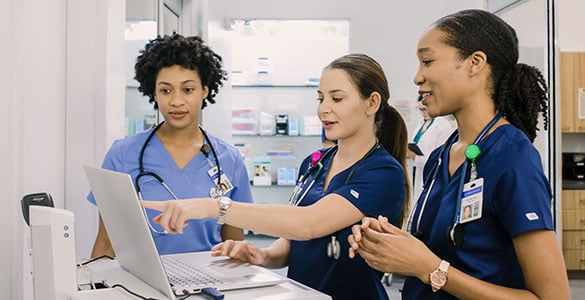
Professional Nursing (ADN/RN) in Tampa, Florida
Associate's Degree
- Next Start Dates
- January 05, 2026
- February 11, 2026
Professional Nursing Program in Tampa, Florida
Discover what your future could look like with a Professional Nursing program. Core Nursing courses online and on campus can help you pursue a registered nurse (RN) career. Build your confidence with other Nursing program students and faculty in a variety of lab settings, including:
- State-of-the-art Simulation Center
- Labor and delivery room
- ICU and medical surgical nursing simulation rooms
- Clinical setting opportunities
Hands-on experience at our Tampa/Brandon campus will prepare students for the NCLEX-RN®3 exam to become the registered nurses that their Florida communities need.
Take me to:
Campus Info
Tampa/Brandon
Nursing Program Information Session
Start sooner without the need to apply twice—as soon as you complete the admissions process, you’re admitted into the Professional Nursing degree program.
- Eight start dates per year
- No prerequisite coursework for admission
- No waiting list for qualified applicants
Licensed practical nurses can advance their education in as few as 18 months2 through our LPN to RN Bridge.
Learn even more about our Professional Nursing program, program requirements, transfer credits, tuition costs, general education courses, nursing core courses, nursing curriculum, nursing practice future and more at our Nursing Information Session.
Speaker 1:
Rasmussen knows nursing.
And the first step in charting your future in the field is joining us at a Nursing Information Session.
Speaker 2 (00:09):
And we just go over all the program details. So, breaking down classes, costs, credit transfer, clinicals, scheduling, hours and expectations, different financial aid options, and then discussing the enrollment process and qualifying.
Info sessions are held, you know, during daytime hours. So, it's a great opportunity for prospective nursing students to actually see our current nursing students.
Speaker 3 (00:32):
I think a Nursing Information Session is great because you actually can come to the campus. You can see what the classrooms look like. Uh, they tour through the SIM lab. Like, days when I'm running SIM they'll, you know, they'll, they say, “Hey, can we come walk through your SIM lab?” And so they get to see what it looks like. They get to look behind the scenes and see this is where the teacher sits.
Speaker 2 (00:54):
Um, there's a chance that it'll be in one of our labs. Um, and then what we do is if there aren't classes going on in our SIM labs, we do try to get the tour of that so that prospective nursing students can actually see the SIMs.
Speaker 3 (01:07):
It's a safe learning environment in that it's okay to make mistakes. Um, where students were learning. No, nobody ever said nursing school would be easy, but it's always worth it at the end that being able to be a nurse—function as a nurse. Um, it's just such a fun career.
Speaker 2 (01:26):
Um, we just assure our students that we do have steps in place. We have internal discounts, um, so corporate partner discount, military discount, and then we have a Change A Life scholarship. So, if a student refers somebody else, that new student whose life is being changed by going to school—maybe for the first time—can receive a scholarship.
Speaker 3 (01:43):
I think people realize that it's the career to be in. It's the career. It's, it's a great career to be in. And I think that's what drives people to go back.
Speaker 2 (01:52):
Just keeping in mind that there's a variety of programs here. There's no one set path that is right. It's just students need to figure out which is gonna be the best path for them.
Speaker 1 (02:02):
Take the next step and join us at a Nursing Information Session. Regularly offered at many Rasmussen campuses.
What Types of Nursing Program Required Courses Will I Take?
As a Professional Nursing program student, you’ll have a combination of online general education courses and in-person Nursing courses at our Tampa/Brandon campus. Here are some of the Nursing core courses that are critical to building confidence and nursing leadership as registered nurses.-
Maternal-Child Nursing
- Study effective care for maternal and pediatric nursing
- Examine relevant medication administration, pharmacology, nutritional principles, and cultural and spiritual diversity
- Review legal and ethical issues related to maternal and pediatric nursing care
-
Nursing Care of the Older Adult
- Examine professional nurse care and health assessment strategies for geriatric nursing patients
- Promote autonomy and safety with adult health decisions as patients age and geriatric nursing ethical advocacy
- Demonstrate your professional nurse skills for adult health needs with a health care team in a clinical setting
-
Mental and Behavioral Health Nursing
- Explore internal and external factors that impact a patient’s mental health nursing care and well-being
- Study effects of stress on a patient and their families and caregivers
- Examine the complexities of caring for clients experiencing mental health disorders
-
Leadership and Professional Identity
- Examine professional nursing leadership and management responsibilities
- Utilize evidence-based practices to guide critical thinking skills and support clinical judgment to improve patient outcomes across the life span
- Demonstrate principles of professional identity and regulatory standards of nursing practice
"Rasmussen is dedicated to the students and their learning. The resources are continuously reviewed to find the most up-to-date, evidence-based learning materials and resources. Even now, the faculty and administration strive to ensure the best learning materials are available to help support the students learning."
Candy Farkas
Nursing Faculty Member, Rasmussen University – Tampa/Brandon Campus
Prepare for the NCLEX-RN Exam
Upon successful completion of our Associate’s degree in Nursing program, you’ll be able to sit for the NCLEX-RN®3 licensing exam to become a registered nurse. Diverse labs help you advance your nursing practice, clinical components let you demonstrate in a healthcare setting, and our learning services help you study to make sure you can put those skills in your community. Here are just a few ways that we help you feel confident about the NCELX-RN licensing exam.
In-Person Practice
Practice your Professional Nursing program skills at the Tampa/Brandon campus nursing skills lab and simulation centers, as well as firsthand in local healthcare settings.
Peer Support
You won’t be preparing for the NCLEX-RN exam alone. Study with other Professional Nursing students, Nursing faculty, healthcare professionals and peer tutors.
Library and Learning Services
Access collections designed for students in all our Nursing programs. Our award-winning online Library and Learning Services team are ready to help.
Take the Next Step—Talk to Us!
Nursing Career Options in Tampa and Brandon in Florida
Useful Reading for Nursing Program Students
Tuition Costs & Savings
Do the Math:
With eight start dates6 a year at most campuses and a total of 25 courses—each 5.5 or 11 weeks in length—full-time students can finish in as few as 21 months2 for an estimated total tuition and fees of $54,551.
$453 tuition per credit
x 102 total credits
_______________________
$46,206 total tuition
+ $8,345 total fees
_______________________
$54,551 estimated total tuition and fees
*This reflects pricing for Florida students. Please speak with an admissions representative or use the tuition estimator tool to calculate your costs.
Learn more about the financial aid cost of attendance (COA).
Other Ways to Save
Nursing education should be a manageable investment. Talk to an admissions representative and learn how our ADN program is designed to be more affordable with transfer credits, self-directed assessments, loans and grants, and corporate and military grants for those who qualify.
Find more about:
Program Requirements
At Rasmussen University Nursing school, there is no prerequisite coursework for admission into the program. At many campuses, there are no wait lists for qualified student applicants.6 With a no-cost application and eight start dates a year for students at most campuses, you can begin your Nursing courses when it's convenient for you.
The degree type can vary based on the state at Rasmussen University. This is an Associate of Science (AS) degree in FL, and an Associate of Applied Science (AAS) degree in MN, IL, KS and WI.
High school verification documentation may be required.5 Students will need to pass an entrance exam or have a conferred Bachelor’s, Master’s or Doctoral degree with a GPA of 2.25 or higher from an accredited institution of higher learning as recognized by the US Department of Education or by the Council for Higher Education Accreditation.
Accreditation
Accreditation Commission for Education in Nursing (ACEN)
The associate nursing program at Rasmussen University at the Tampa/Brandon campus located in Brandon, Florida, is accredited by the:
Accreditation Commission for Education in Nursing (ACEN)
3390 Peachtree Road NE, Suite 1400
Atlanta, GA 30326
404-975-5000
The most recent accreditation decision made by the ACEN Board of Commissioners for the associate nursing program is Continuing Accreditation.
View the public information disclosed by the ACEN regarding this program at
https://www.acenursing.org/search-programs
Higher Learning Commission (HLC)
Rasmussen University is accredited by the Higher Learning Commission (hlcommission.org), an institutional accreditation agency recognized by the U.S. Department of Education.




